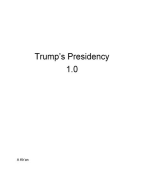AT 6:35 A.M. ON MARCH 4, PRESIDENT Donald Trump launched an attack against the government of the United States. Deploying his favorite weapon, Twitter, he wrote, “Terrible! Just found out that Obama had my ‘wires tapped’ in Trump Tower just before the victory. Nothing found. This is McCarthyism!” In fewer than 140 characters, he accused a former President of an impeachable offense, suggested that Justice Department agents might have engaged in a felony and gestured at the possibility that federal judges enabled a political outrage.
He wasn’t finished. Over the next half hour—as Trump’s staff, left behind in Washington, began waking up and unlocking their phones to discover what the boss was up to down at Mar-a-Lago—the President added two more tweets suggesting that Obama and federal investigators had broken the law and should be prosecuted. He capped his indictment with a fourth blurt, comparing the allegation with the worst political crisis of his 70-year lifetime. “How low has President Obama gone to tapp [sic] my phones during the very sacred election process. This is Nixon/Watergate. Bad (or sick) guy!”
Trump was right that the government now faces a test of historic dimensions. The FBI is probing a plot by Russia to subvert the core exercise of American democracy in the 2016 presidential election. Revelations of contacts between Trump aides and Russian officials have forced the resignation of the President’s National Security Adviser, Michael Flynn, and the recusal of his Attorney General, Jeff Sessions. This probe, which may or may not have involved court-approved surveillance, has unleashed an orgy of political exploitation, resulting in a crisis of confidence in the government’s ability to play by the rules.
But no matter what he tweets from his Palm Beach Xanadu, Trump is more author than victim of this crisis. Neither he nor his White House staff provided any evidence for his extraordinary accusations against what some of them call a “deep state.” Obama denied Trump’s assertions, and was soon joined by former Director of National Intelligence James Clapper and, via intermediaries, FBI Director James Comey. Trump is rallying his political base against the federal agencies he oversees, thus partnering his presidency with a radical

























